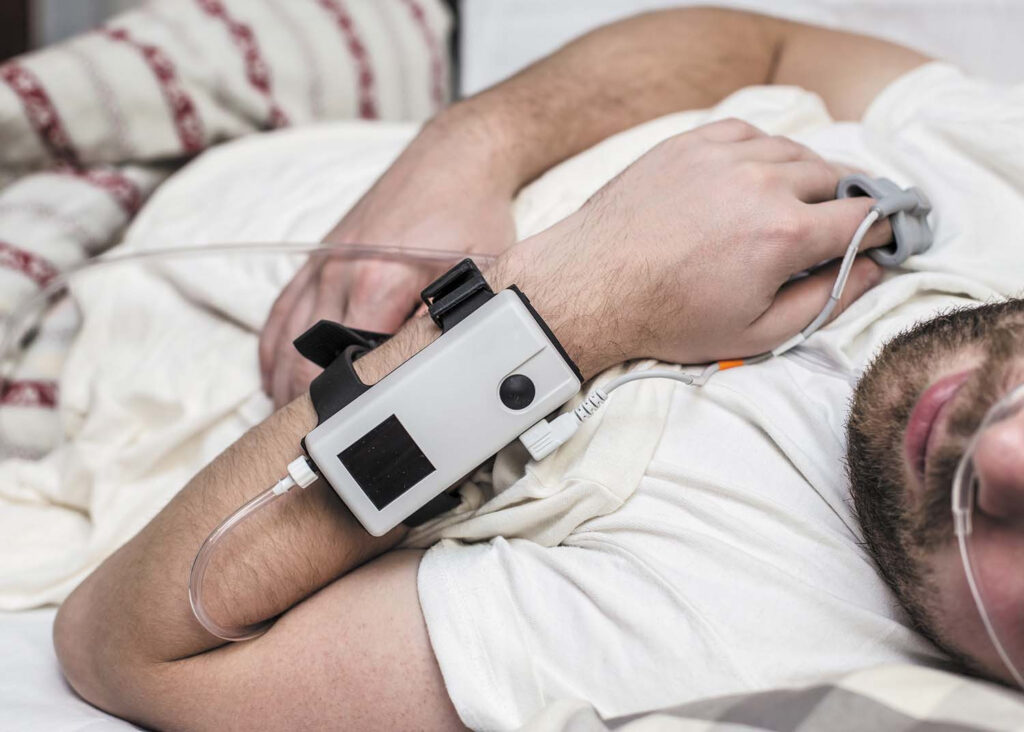In our fast-paced modern lives, where stress and distractions abound, getting a good night’s sleep can often be a challenge. However, sleep plays a crucial role in our overall health, affecting our physical and mental well-being. This is where sleep tests come into play, offering a comprehensive assessment of your sleep health.
Improving Your Sleep Health
If your sleep study Australia reveals any issues or if you simply want to optimize your sleep health, there are steps you can take to improve your sleep quality.
Understanding the intricacies of sleep health involves delving into various aspects of your daily routine and environment. It’s not just about the number of hours you spend in bed but also the quality of sleep you experience. By exploring different strategies and techniques, you can enhance your overall well-being through improved sleep.
Lifestyle Changes for Better Sleep
Simple lifestyle adjustments can have a profound impact on your sleep health. Establishing a consistent sleep schedule, creating a relaxing bedtime routine, and creating a sleep-friendly environment can significantly improve your ability to fall asleep and stay asleep throughout the night.
Moreover, incorporating mindfulness practices such as meditation or gentle yoga before bedtime can help calm the mind and signal to your body that it’s time to unwind. These small yet powerful habits can pave the way for a more restful and rejuvenating night’s sleep.
See Also: These cleaning tips will help your CPAP machines last long
Medical Interventions for Sleep Disorders
In cases where sleep disorders are diagnosed, medical interventions may be necessary. Treatment options range from medication and therapy to continuous positive airway pressure (CPAP) machines for conditions like sleep apnea. Consulting with a sleep specialist can help determine the most appropriate treatment plan tailored to your specific needs.
Additionally, exploring alternative therapies such as acupuncture or cognitive behavioral therapy for insomnia can offer holistic approaches to addressing underlying issues contributing to sleep disturbances. It’s essential to consider a comprehensive approach to sleep health that encompasses both conventional and complementary treatments for optimal results.
By undergoing a sleep test, you gain valuable insights into your sleep health, allowing you to take proactive steps towards improving your overall well-being. Whether it’s making lifestyle changes or seeking medical interventions, the path to better sleep health begins with understanding your individual sleep patterns. So, step into the realm of sleep testing and embark on a journey towards a healthier and well-rested you.
Understanding the Importance of Sleep Health
It’s no secret that sleep is essential for our bodies to function optimally. Adequate sleep allows our bodies to rest, repair, and recharge, ensuring that we wake up refreshed and ready to tackle the day. But sleep health goes beyond mere restfulness – it impacts our cognitive functions, emotional stability, and even our immune system.
Sleep is a complex biological process that involves different stages, each serving a unique purpose. During the deep stages of sleep, the body repairs tissues, synthesizes proteins, and releases growth hormones crucial for development and immune function. Rapid Eye Movement (REM) sleep, on the other hand, plays a vital role in memory consolidation and emotional regulation. By understanding these intricate mechanisms, we can appreciate the profound impact of quality sleep on our overall well-being.

The Role of Sleep in Overall Health
Not getting enough sleep can lead to a variety of health problems. Chronic sleep deprivation has been linked to an increased risk of obesity, diabetes, cardiovascular disease, and mental health disorders. Furthermore, poor sleep quality can impair our memory, attention, and decision-making abilities, affecting our performance at work or school.
It’s essential to prioritize sleep hygiene practices to promote restorative sleep. Creating a consistent bedtime routine, optimizing your sleep environment, and avoiding stimulants like caffeine before bed can significantly enhance the quality of your sleep. By adopting these habits, you can support your body’s natural circadian rhythm and improve your overall sleep health.
Common Sleep Disorders in Australia
Australia has a significant prevalence of sleep disorders, with conditions like obstructive sleep apnea, insomnia, and restless leg syndrome affecting a significant portion of the population. These disorders disrupt the normal sleep patterns, leading to daytime fatigue, reduced productivity, and an overall decline in quality of life.
Seeking professional help for sleep disorders is crucial in managing symptoms and improving sleep quality. From continuous positive airway pressure (CPAP) therapy for sleep apnea to cognitive-behavioral therapy for insomnia, there are various effective treatments available. By addressing underlying sleep issues, individuals can experience profound improvements in their overall health and well-being.
The Science Behind Sleep Tests
Sleep tests, also known as polysomnography, are diagnostic tools that monitor and record various physiological parameters during sleep. This allows healthcare professionals to assess the quality and quantity of your sleep. Understanding how sleep tests work can help you make informed decisions about your sleep health.
Polysomnography involves the use of electrodes attached to different parts of your body to monitor brain waves, eye movements, muscle activity, heart rate, and breathing patterns. These electrodes are painlessly placed on your scalp, face, chest, and legs to gather comprehensive data while you sleep. The information collected provides valuable insights into your sleep patterns and any underlying sleep disorders.
The Mechanics of Sleep Stages
During sleep, our bodies go through different stages, each serving a specific purpose. These stages include NREM (non-rapid eye movement) sleep and REM (rapid eye movement) sleep. NREM sleep can be further divided into three stages, with each stage playing a distinct role in sleep restoration and maintenance.
NREM Stage 1 is the lightest stage of sleep, where you may drift in and out of consciousness. NREM Stage 2 is characterized by a decrease in body temperature and heart rate as your body prepares for deep sleep. NREM Stage 3, also known as slow-wave sleep, is the deepest stage where your body repairs tissues and strengthens the immune system. REM sleep, on the other hand, is when most dreaming occurs, and the brain consolidates memories and processes emotions.
How Sleep Tests Measure Sleep Quality
Sleep tests collect data on various parameters throughout the night, including brain activity, heart rate, oxygen levels, and breathing patterns. This data is then analyzed by sleep specialists to evaluate the quality of your sleep. Sleep efficiency, sleep latency, and the number of awakenings are some of the factors assessed to determine sleep quality.
By analyzing the data gathered during a sleep test, healthcare providers can identify sleep disorders such as sleep apnea, insomnia, narcolepsy, and restless legs syndrome. This information is crucial for developing personalized treatment plans to improve your sleep quality and overall well-being. Understanding the mechanics of sleep stages and how sleep tests measure sleep quality can empower you to take control of your sleep health and make informed decisions about your lifestyle and treatment options.

Types of Sleep Tests Available in Australia
Australia offers a variety of sleep tests to cater to individual preferences and requirements when it comes to assessing sleep quality and identifying potential sleep disorders. These tests play a crucial role in diagnosing and treating various sleep-related issues, ultimately improving overall health and well-being.
When considering sleep tests in Australia, individuals have the option of choosing between home sleep tests and in-lab sleep tests, each offering unique advantages and insights into their sleep health.
Home Sleep Tests
Home sleep tests have become increasingly popular among individuals who prioritize comfort and convenience. These tests involve wearing portable monitoring devices while sleeping in the familiar surroundings of one’s own bed. While home sleep tests may not provide the same level of comprehensive data as in-lab tests, they offer a practical and accessible way to monitor essential sleep parameters.
Furthermore, home sleep tests are particularly beneficial for individuals with busy schedules or those who may feel anxious in a clinical setting. By undergoing a sleep test at home, individuals can relax in a familiar environment, potentially leading to more accurate results that reflect their typical sleep patterns.
In-Lab Sleep Tests
In contrast, in-lab sleep tests offer a more immersive and detailed assessment of an individual’s sleep quality and patterns. Conducted in a specialized sleep center, these tests involve spending a night under the observation of sleep specialists and connected to various monitoring devices.
During an in-lab sleep test, experts can monitor a wide range of parameters, including brain activity, heart rate, breathing patterns, and movements during sleep. This comprehensive approach allows for the accurate diagnosis of conditions such as sleep apnea, insomnia, narcolepsy, and restless legs syndrome, among others.
Interpreting Your Sleep Test Results
Once your sleep test is complete, it’s important to understand how to interpret the results to gain insight into your sleep health.
After a sleep test, the data collected is analyzed to provide a detailed assessment of your sleep patterns and quality. This analysis involves evaluating various factors, including the duration and stages of your sleep, breathing patterns, and any disruptions during the night. By delving into these details, healthcare professionals can uncover underlying issues affecting your sleep.
Understanding Sleep Test Scores
Sleep test results are typically scored using established guidelines. These scores provide an objective assessment of your sleep quality, allowing healthcare professionals to identify any abnormalities or potential sleep disorders. Understanding the scoring system can help you comprehend the severity of any sleep-related issues.
The scoring of a sleep test involves different parameters, such as the number of apnea episodes, oxygen levels during sleep, and the frequency of awakenings. Each of these factors contributes to an overall score that indicates the presence and severity of any sleep disorders. By interpreting these scores, healthcare providers can tailor treatment plans to address specific sleep issues effectively.
What Your Sleep Test Results Mean for Your Health
Your sleep test results can provide valuable information about your overall health and well-being. They can help pinpoint the presence of sleep disorders, such as sleep apnea or insomnia, and guide appropriate treatment strategies. It’s crucial to discuss the results with your healthcare provider to determine the best course of action.
Furthermore, understanding your sleep test results can offer insights beyond just sleep disorders. Issues like poor sleep quality can impact various aspects of your health, including cognitive function, mood regulation, and overall quality of life. By addressing any concerns highlighted in your results, you can take proactive steps to improve not only your sleep but also your overall well-being.
